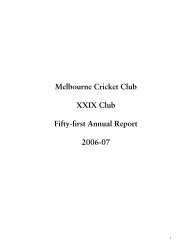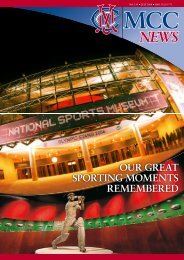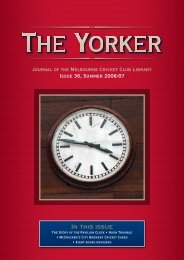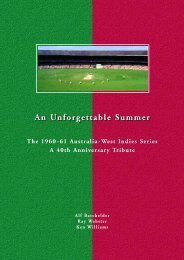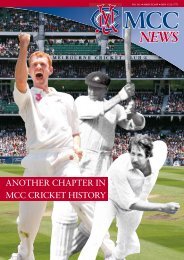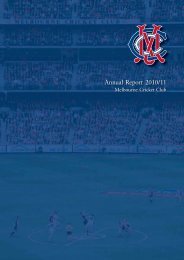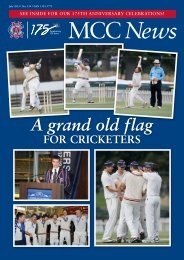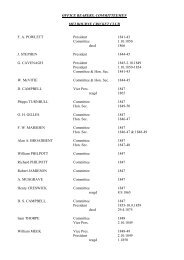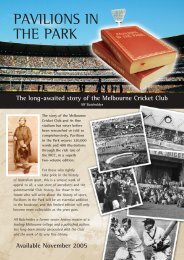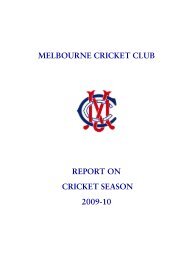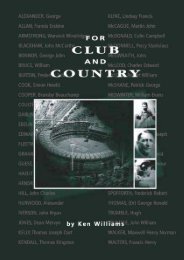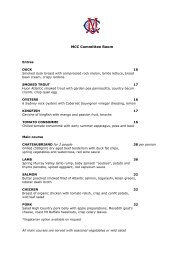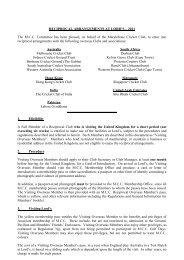Issue 42: Spring 2010 - Melbourne Cricket Club
Issue 42: Spring 2010 - Melbourne Cricket Club
Issue 42: Spring 2010 - Melbourne Cricket Club
You also want an ePaper? Increase the reach of your titles
YUMPU automatically turns print PDFs into web optimized ePapers that Google loves.
Other documents uncovered include a treasure<br />
of minute books, notably the 1872-1878 minute<br />
book which has been missing for some years<br />
and, hence, was never microfilmed during the<br />
microfilming project undertaken in the 1990s.<br />
Also extracted from storage are the plans to<br />
renovate the <strong>Melbourne</strong> Football Ground in<br />
the 1880s and the most fascinating of these<br />
artefacts is a handwritten original diagram –<br />
drafted by the notable early Australian Rules<br />
football player and administrator, H.C.A<br />
Harrison – which depicts where football was to<br />
be played.<br />
This was the original area used outside the<br />
MCG for football and the area indicated in the<br />
plan would have been used in conjunction<br />
with the famous reversible stand which<br />
enabled spectators to watch cricket in<br />
summer and have the seats turned around to<br />
watch football in winter.<br />
One of the many fragile letter books examined<br />
so far contains a captivating handwritten<br />
account of life in Victoria in which Curtis Reid<br />
(the first paid secretary of the MCC) invites “a<br />
team of gentlemen cricketers from England<br />
to play a series of matches in these Colonies<br />
during the Australian summer of 1878 and<br />
1879”. The letter sets out to attract the<br />
English visitors with evocative descriptions of<br />
a proposed sightseeing tour of Victoria, New<br />
South Wales and Tasmania.<br />
A large batch of Ben Wardill's personal<br />
papers relating to his employment with The<br />
Reiwa Sugar Company has been unearthed<br />
and research has identified the national<br />
importance of these items, which were listed<br />
some years ago on the Register of Australian<br />
Archives & Manuscripts. The correspondence<br />
depicts a very differently paced and organised<br />
world before the introduction of the telephone or the motor car.<br />
Other items include a selection of fascinating correspondence<br />
from the 1890s between MCC secretary Ben Wardill and the<br />
secretary of The Australasian <strong>Cricket</strong> Council. These documents<br />
refer to the proposed donation of 150 guineas for an intercolonial<br />
trophy, later known as the Sheffield Shield, and foreshadow the<br />
arrival of Earl of Sheffield in Australia in 1891/92 as the promoter<br />
of the English team which played three Tests in <strong>Melbourne</strong>,<br />
Sydney and Adelaide, led by W.G. Grace. At the conclusion of<br />
the tour, Lord Sheffield donated £150 to the New South Wales<br />
<strong>Cricket</strong> Association to fund a trophy for an annual tournament of<br />
intercolonial cricket in Australia.<br />
The impact of original documents cannot be overstated. They are<br />
the living material trace of the life and times of past generations<br />
recreated vividly and evocatively on fragile paper fragments. The<br />
stories preserved in the archives not only transport us to the past but<br />
remind us of our shared humanity. Archives record our experiences –<br />
the triumphs and the failures, the challenges and aspirations.<br />
The holdings of the MCC archive consist of more than 87 linear<br />
metres of shelf space comprising about 500 bound volumes<br />
and 300 boxes of loose correspondence including financial,<br />
administrative, cultural/social and historical records such as<br />
ledgers, minute books, letter books, membership books, receipt<br />
Receipt for £150 donated on behalf of the Earl of Sheffield<br />
by Major B. J. Wardill for manufacture of the Sheffield Shield.<br />
MCC Archives, Acc 631<br />
books, stile books, scorebooks, scrapbooks, maps, sketches and<br />
personal and business correspondence.<br />
Some dedicated volunteers have been assisting in the long task of<br />
identification, preservation and researching of material. Their time<br />
and effort is extremely valued and appreciated in the uncovering of<br />
the secrets and the significance of the MCC archive. It is anticipated<br />
that active collecting will begin as soon as the necessary procedures<br />
for the smooth working of the archives have been installed.<br />
Archives are authentic evidence of our past. They preserve the<br />
personal, corporate and social memory of society and inform<br />
the search for our identity and our place in the world. Archives<br />
are valued for their administrative, legal and historical function<br />
and as such they document the growth and development of our<br />
environment and our culture.<br />
The research potential of the MCC archives is tremendous.<br />
There is a wealth of historical information and a storehouse<br />
of memories to be unearthed which open a window to the<br />
beginnings of the <strong>Melbourne</strong> <strong>Cricket</strong> <strong>Club</strong> and the development of<br />
its vital and dynamic role in the life of Australian society.<br />
Acknowledgements: David Studham<br />
Patricia Downs<br />
MCC Archivist<br />
The Yorker - <strong>Spring</strong> <strong>2010</strong> 7



